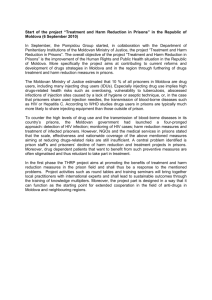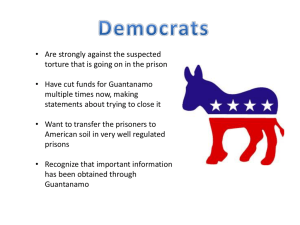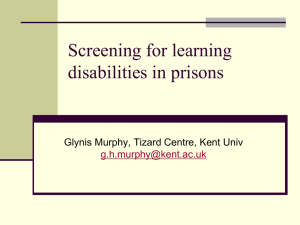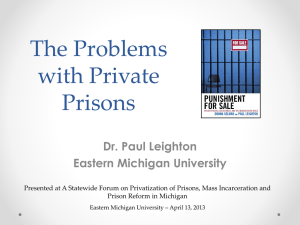Prisons Act South Sudan 2003
advertisement
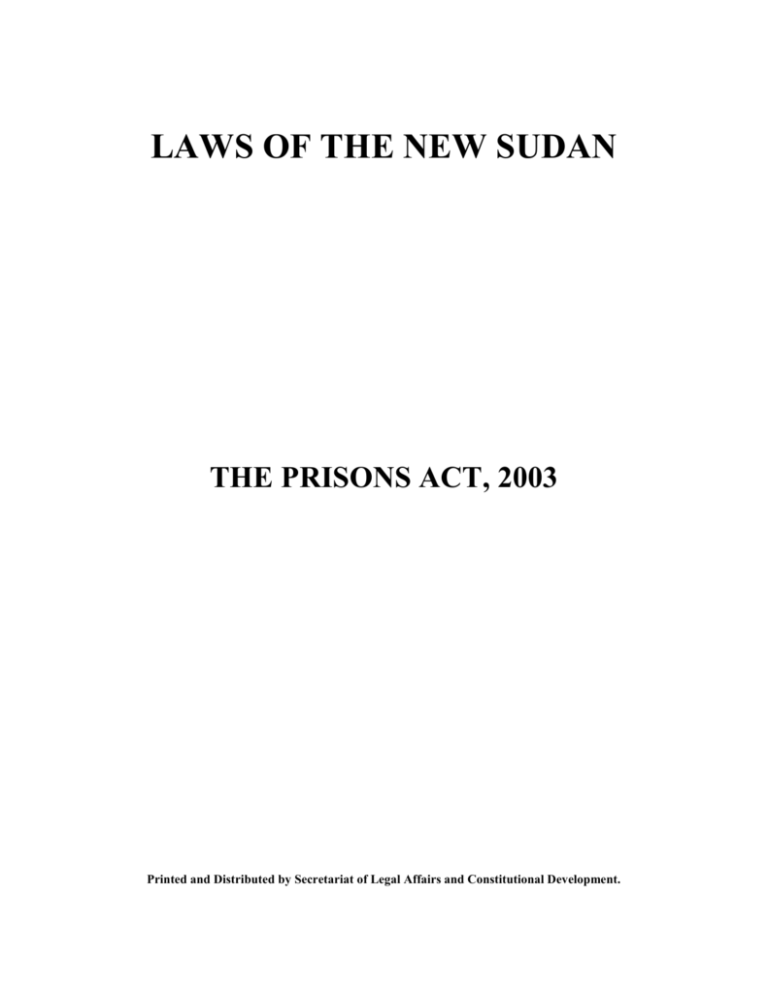
LAWS OF THE NEW SUDAN THE PRISONS ACT, 2003 Printed and Distributed by Secretariat of Legal Affairs and Constitutional Development. Table of Contents CHAPTER 1 …………………………………………………………………… PRELIMINARY ……………………………………………………………….. CHAPTER 2 …………………………………………………………………… DELEGATION OF POWERS …………………………………………………. CHAPTER 3……………………….………………………………………..…. CONSTITUTION, DUTIES AND POWERS OF THE PRISONS FORCES………………………………………………………………………… CHAPTER 4 …………………………………………………….…………….. APPOINTMENTS AND DUTIES OF OFFICERS……………….……………. CHAPTER 5 …………………………………………………………………… OFFENCES,CONTRAVENTIONS AND PENALTIES……………………….. CHAPTER 6 …………………………………………………………………… PLACEMENT ON NON-EFFECTIVE LIST………………………………….. CHAPTER 7 …………………………………………………………………… TYPES OF PRISONS ………………………………………………………….. CHAPTER 8…………………………………………………………………… MISCELANEOUS PROVISIONS……………………………………………... O A T H ………………………………………………………………………… 1 (PROVISIONAL ORDER) LAWS OF THE NEW SUDAN THE PRISONS ACT, 2003 CHAPTER 1 PRELIMINARY Section 1. Title and Commencement. This Act may be cited as “THE PRISONS ACT, 2003” and shall come into effect on the date of signature. Section 2. Repeal and Saving. The Prisons Act, 1994 is hereby repealed, provided all proceedings, Orders and Regulations made or issued there under shall be valid till repealed or amended in accordance with the provisions of this Act. SECTION 3. Application. This Act shall apply to the Officers, Non-Commissioned Officers and Guards of the Prisons’ Force, and to any class of persons in relation to whom the Commissioner for Interior, may make any order in accordance with the provisions of this Act. SECTION 4. Interpretations. In this Act, unless the context otherwise requires:“Chairman” means the Leader of Sudan People’s Liberation Movement (SPLM) “Commissioner” means commissioner for Interior “Inspector General” means Inspector General of the New Sudan Prisons. “Secretariat” means Secretariat of Interior. “Leadership Rank” means a rank of Lt.Col. and upwards. “Prisons Force” Means the Prisons Force constituted in accordance with the provisions of Section “7” of this Act. “Officer” means any Prisons Officer of the following disciplinary ranks:(i) Commander (Cdr.) (ii) Alternate Commander (A/Cdr.) (iii) Lieutenant Colonel (Lt. Col.). (iv) Major. (v) Captain (Capt.) (vi) First Lieutenant (1st. Lt.) (vii) Second Lieutenant (2nd. Lt.) 2 “Non-Commissioned Officer” (i) (ii) (iii) (iv) (v) means any Prisons Non-Commissioned Officer of the following disciplinary ranks:- Regimental Sergeant Major (R/SM) Sergeant Major (SM) Sergeant (Sgt.) Corporal (Cpl) Lance Corporal (L/Cpl) “Other Ranks” means Non-Commissioned Officers and Guards. “Private” means any other rank below the rank of an NCO. “Officer In Charge” means the Officer appointed by the Inspector General or Regional Director of Prisons to take charge of the Administration of Prisons in the Regions, Counties, Payams, Labour Camps, and any Section in the New Sudan Prisons Headquarters, or Prisons College. “Guards” means persons of other ranks, and any person charged with the work of guarding. “Committee” means the Prisons Committee constituted in accordance with the provisions of Section 13 of this Act. “Prison” means a place in which a person convicted by a competent authority in accordance with law is detained, work for the community or trained for new skills and includes Reformatories, Mental Asylums, Camps and Juvenile Homes. CHAPTER 2 DELEGATION OF POWERS SECTION 5. Power of the Commissioner to Delegate Powers and Constitute Reserve Forces. The Commissioner for Interior may, by order, authorize any person, or class of persons with all or part of the powers vested upon him or upon the members of the Prisons Force, or constitute a reserve additional force for the Prisons to exercise the duties specified in such order. 3 SECTION 6. Delegation of Powers. The Commissioner may delegate all, or part of his powers under this Act, to the Inspector General of Prisons, or any other prisons officer whom he thinks appropriate, and the Inspector General of Prisons may delegate all, or part of his powers under this Act, to his Deputy or Assistants. CHAPTER 3 CONSTITUTION, DUTIES AND POWERS OF THE PRISONS FORCE. SECTION 7. (1) (2) The Prisons force is a disciplinary force, and shall consist of: (a) Prisons Officers. (b) Non-Commissioned Officers and Guards. The Prisons force shall be divided administratively and technically as the Commissioner for Interior may prescribe. SECTION 8. Command of Prisons Forces in the Regions. (1) Subject to the Provisions of this Act, Prisons Forces in the Regions, Counties, Payams, Prisons Headquarters and Prisons College shall be under the command of the Inspector general who may delegate all or part of his powers to the Officers in Charge. (2) (i) (ii) The Inspector General shall be charged with the demonstration, organization, and formulation of the policy of Prisons Force, and shall be responsible for the control of financial affairs relating to Prisons Force, and shall be responsible for the afore-going to the commissioner. The Inspector General may, at any time enroll fit persons in the other ranks for the purpose of filling vacant positions in the Prisons Force in accordance with Regulations and Orders. The Inspector General may, at any time fill by way of promotion the vacant posts in other ranks in the Prisons force in accordance with Regulations. SECTION 9. Duties of Prisons Force: The Prisons Force shall basically be employed in:(i) (ii) (ii) (iii) execution of Judicial Decrees and orders. administration of Prisons, and maintenance of security therein. preservation of the safety of prisoners, their training, and qualification doing any other work in accordance with the Provisions of this Act. 4 SECTION 10. Responsibility of Prisons Force for Public Property. (1) Members of Prisons force shall be responsible for public property, movable, or immovable, which is under their responsibility, custody or trust, and also for the arms, ammunitions, equipment, clothing, tools and instruments issued for their use; and in case of loss or damage, measures prescribed by, this Act and or regulations shall be taken. (2) Every member of Prisons Force shall be bound to surrender the property entrusted to him to the person nominated, and at the place specified for such surrender, and shall be bound to surrender the afore-said when he relinquishes his post in the Prisons Force for any reasons, and if he fails to surrender, such property or looses or damages or renders it useless or fails to preserve the same, he shall be bound to pay the prescribed compensation in this respect in addition to any other penalties which may be imposed on him. SECTION 11. Obligations of Members of Prisons Force: (1) Every person enrolled in the Prisons force shall be obliged to devote his full time to the performance of his duties provided for in this Act. He shall, further at all times, and within the limits of his duties, obey any order made by his superior Officer, and shall exert his utmost efforts to execute it. (2) For the purposes of this Act, a member of the Prisons Force shall be deemed to be in service for twenty-four hours a day. (3) A member of the Prisons Force suspended from work but not removed from the Force shall not be exempted from the application of the provisions of this Act. SECTION 12. Merging of Prisons Force in Other Regular Forces: (1) The Chairman and Commander-In-Chief, may at any time, order the merging of the Prisons force, or the force of any Prison or Unit or Units thereof, in the SPLA forces, and the Prisons force, so merged shall throughout the period specified in the order, form part of the SPLA Forces, be subject to its Military law, and perform the duties and enjoy the rights as prescribed thereof. (2) The Commissioner for Interior, may at any time order the merging of any Prisons Force, or Force of any Prison, or Unit, or units thereof in the Police Force, and such force shall throughout the period specified by the order, form part of the Police force and shall be used for Police purposes, and be subject to the provisions of the Police Act 2003. SECTION 13. Establishment and Constitution of Prisons Committee: (1) There shall be a established a Consultancy Committee called Prisons Committee which shall be constituted as follows:(a) (b) Director General of the Secretariat - Chairman The Inspector General - Secretary. 5 (c) (e) (f) (g) Representative of Judiciary – Member. Representative of Social Welfare – Member. Representative of Health - Member. Representative of Woman and Child Welfare - Member (2) The Committee may invite any other person whom it thinks appropriate to state, or air opinion on any issue under consideration The Committee shall meet at least twice a year on the invitation of its Chairman and the secretarial work shall be carried out by an Officer appointed for that purpose, who shall not participate in the deliberations of the Committee. (3) SECTION 14. Functions of the Committee: In addition to any other functions which may be conferred upon it under this Act, or any other Law, the Committee shall be competent to do the following:(a) (b) (c) (d) promotion of Prisons Force, and raising of the standard and efficiency thereof. study plans relating to the improvement of Prisons conditions and formulate policies for their care and treatment. draw up working programmes for training of prisoners and their qualification. work for the promotion and improvement of prisoners conditions. CHAPTER 4 APPOINTMENTS RELIEVE AND DUTIES OF OFFICERS AND OTHER RANKS. SECTION 15. Appointment and Relieve of Inspector General : The Chairman shall in consultation with Commissioner appoint and relieve Inspector General. SECTION 16. Commissioning and Appointment of Officers: Prisons Officers shall be commissioned into the Prisons Force by the Chairman and appointed by the Commissioner for Interior in accordance with the provision of this Act and Regulations made there-under. SECTION 17. Duties of the Officers in General. Every Officer shall:(a) (b) preserve the dignity of his office, and behave in a manner compatible with his position. perform the functions and duties assigned to him efficiently and honestly. 6 (c) (d) perform all other functions and duties specified by Regulations made under this Act. give accurate orders and supervise the carrying out of such orders within the limit of his function. SECTION 18. Residence for Officers: Every Officer shall reside in a place within the local limits of his unit, and shall not reside elsewhere, except for reasons approved by the Officer In Charge. SECTION 19. Confidentiality: (1) No Officer shall communicate or disclose any information which by its nature, is classified as confidential, or is made so by special orders to any person other than the competent authority. (2) No Officer shall keep for himself any official document or remove such document from the file, in which the same is kept, even though it relates to specific work assigned to him personally. SECTION 20. Engagement in an Unofficial Work: No Officer shall engage in an unofficial work without prior written authorization from an appropriate authority. SECTION 21. Employment in Companies and Corporations: No Officer shall accept employment or membership of a private Company, NGO, or Corporation except with prior written permission from the appropriate authority. SECTION 22. Application of the Provisions of Sections 17 to 21 to Other Ranks: The provisions of Sections 17 to 21, inclusive, shall apply to other ranks of the Prison Force. CHAPTER 5 OFFENCES, CONTRAVENTIONS AND PENALTIES SECTION 23. Offences: (1) Any person subject to the provisions of this Act, who neglects to carry out his duties without any reasonable excuse or, commits gross negligence, or assaults any person, or intentionally refuses to obey any order made by a superior Officer or absents himself from duty without permission for a period of twenty-one days, commits an offence under this Act. (2) Any person subject to the provisions of this Act, who screens, or causes, or attempts to cause any disturbance, or disobedience in prison, or assist, or participates in the same, or does not exert effort to put down such disturbance, or disobedience, commits an offence under this Act. 7 SECTION 24. (3) Any person under the provisions of this Act, who is accused of committing an offence under sub-sections (1) and (2) of this Section may, with the consent of the appropriate Prisons Authority be tried before a competent Court of law and shall on conviction be punished with imprisonment for a term not exceeding two years or with fine or with both. (4) The punishments provided in sub section (3) of this Section may be imposed in addition to any other punishment, or any action to which such person is liable under this Act, or any other law. Contraventions: Subject to the provisions of this Act, any person shall be deemed to have committed a contravention punishable under Sections 25, and 34, if he:(i) uses, or attempts to use criminal force against any other person subject to this Act or against his Superior Officer. (ii) uses, or attempts to use criminal force, against any other person subject this Act, or against his subordinate or assaults, or mistreats such person. (iii) fails to executed lawful orders made by his superior officer. (iv) utters words which show rudeness, or disobedience to his Superior Officer during performance of his duties or otherwise. (v) vacates the barracks or known residence without prior notification to the appropriate authority. (vi) pretends to be sick or intentionally prolongs the time of his treatment or causes any disability, or injury to himself which may result in his unfitness for service. (vii) conveys any false information connected with his duties, or falsely accuses any person. (viii) improperly conducts himself in a manner un-becoming with the respect attributed to his position. (ix) fires a gun in contravention of the Regulations made under this Act. (x) commits an act prejudicial to good order and discipline. SECTION 25. Disciplinary Penalties: The following penalties or any of them may be imposed on any Officer who commits any of the contraventions set out in Section 24 of this Act. (i) (ii) (iii) (iv) (v) (vi) (vii) dismissal from prisons service. demotion. simple or severe reprimand. deprivation from promotion for a period not exceeding one year. cut of pay from the monthly basic pay, provided that it shall not exceed one quarter of such pay. deprivation from annual increment. suspension of annual increment for a period not less than three months and not exceeding six months. 8 (viii) warning once a year. Note:- More than one warning a year shall lead to dismissal or severe punishment. SECTION 26. Prisons Board for Officers: (1) The Commissioner for Interior, may by an order, constitute a High Board for trial of an Officer from the Rank of Lt. Colonel upwards. (2) For the purpose of trying an Officer lower in rank than Lt. Colonel the Inspector General or any other Officer whom he may delegate, by an order, shall constitute a Summary, or non-Summary Board. SECTION 27. Constitution of Prisons Boards. (1) The Prisons Boards may be constituted as follows:(a) A Prisons High Board consisting of three (3) Officers not lower in rank than Prisons Lt. Colonel, and the order of constitution shall specify the Chairman, and members. (b) A non-Summary Prisons Board consisting of three Officer, not lower in rank than the accused officer, and the order shall specify the Chairman and members. (c) A summary Prisons Board consisting of one Officer higher in Rank than the accused Officer provided that no Officer in the Rank of Prisons Lt.Col. shall be tried summarily expect by the Prisons Commander. (2) One Prisons Board may be constituted for trial of a number of Officers accused of the commission of any contravention, unless it appears that the defense of any of accused Officers may be prejudiced. SECTION 28. Powers of the Boards: (i) A Prisons High or Non-Summary Board may impose the penalties provided in Section 25 of this Act. (ii) A Summary Prisons Board may impose the penalties provided in paragraphs (vi) to (viii) of Section 25 of this Act. SECTION 29. Procedure of Prisons Boards: The Order for committal for trial before a Prisons Board shall be issued by the Prisons Cdr., after investigating into the accusation made against any Officer, and shall include statements of the charges against the Officer who shall be notified in writing of the alleged offence, and the date of trial thereof not less than Fortyeight hours before hearing. 9 SECTION 30. Hearing before Board: (1) Every charge shall be heard before Prison Board in the presence of the accused Officer, who may cross-examine any witness and make any statement in defense verbally or in writing provided that the statements of all witnesses and the accused Officer shall always be recorded in writing by the Prisons High Board or non-Summary Prisons Board. (2) The Accused Officer may ask for the inclusion of reports related to him in the record of trial. (3) The Accused Officer may call a friend to assist him in his defence. (4) The accused Officer may be tried in his absence if inspite of being summoned fails to attend and he shall be retired if he shows sufficient cause which prevented him from attendance. SECTION 31. Findings of the Boards. (1) A Prisons Board shall, at the end of proceedings forthwith notify the accused Officer of the findings. However the accused Officer shall not be informed of the sentence by a Prisons High Board, except after confirmation by the commissioner for Interior. He shall not also be informed and notified of the sentence made by Non-Summary Board which includes the imposition of the penalties provided in sub-sections (i), (ii) and (iii) of Section 25. (2) The Commissioner for Interior, or the Inspector General may at any time at the end of the proceedings of a Prisons Board and after the accused Officer is notified of the findings, call for the record of trial (proceedings) for revision and in such a case the Commissioner for Interior, or the Inspector General, as the case may be, shall exercise the powers setout in Section 33. SECTION 32. Appeals. (i) The aggrieved Officer may appeal to the Inspector General against any penalty by the Summary Prison Board, and the decision of the Inspector General in such case shall be final. In case the penalty was imposed by the Inspector General, he may appeal to the Commissioner, and the decision of the Commissioner shall be final. (ii) The aggrieved Officer may appeal to the Commissioner against any penalty imposed by a Non-Summary Prisons Board and the decision of the Commissioner shall be final except in cases of dismissal where an appeal may be made to Chairman against any penalty imposed by a Prisons High Board. SECTION 33. Power of Appellate Authority. Any Appellate Authority to which an appeal lies under Section 32 may:(a) (b) (c) (d) Confirm the Finding and Penalty; or Confirm the Finding and reduce the Penalty; or Alter it to any lesser penalty, or annul the Finding and Penalty; or Order retrial. 10 SECTION 34. Penalties Awarded to Other Ranks. The authorities specified by Regulations may impose upon to the members of the other Ranks the following penalties:(a) (b) (c) (d) (e) (f) (g) (h) (i) (j) dismissal from service, provided that the dismissal of Prisons R/SM shall be subject to the confirmation by the Inspector General. cut of pay, demotion or both, provided that the R/SM (Regimental Sergeant Major) shall not be demoted except after the confirmation by the Inspector General. deprivation of annual increment for a period not exceeding one year. confinement to barracks for seven days without pay and allowances with or without punishment drill. confinement to barracks for fifteen days without pay and allowances with or without punishment drill. punishment drill for fifteen days or less. extra duty for seven days. confinement to barracks for ten days with or without punishment drill. fine not exceeding seven days par. Simple or severe reprimand. SECTION 35. Suspension from Duty. (1) The Inspector General or Officer in-Charge may suspend from duty any Officer if public interest or service so requires. (2) If it appears that the suspension was not correct the Commissioner shall immediately allow the suspended Officer to resume his duties. (3) The Inspector General or Officer in Charge shall suspend any member of the other ranks if public interest or service so requires. (4) The Regulations shall prescribe the procedure for suspension, confinement, imprisonment and the proportion of the pay to be paid to persons suspended confined or imprisoned. (5) The imposition of any disciplinary penalty under this Act, shall not prevent the imposition of any other punishment provided by any other Law. (6) Members of Prisons Force sentenced to imprisonment shall serve their terms of imprisonment in prisons other than those in which they had been serving, and where that is impossible they shall be separated from other prisoners. CHAPTER 6. SECTION 36: Placement on Non-effective List: The Commissioner on the recommendation of the Inspector General may place any Officer on the Non-effective list for a period not exceeding two years for the following reasons:(a) (b) (c) if he is performing his duties in an unsatisfactory manner. if it is proved that he is temporarily medically unfit for public service. if the Commissioner deems it necessary in the interest of service. 11 SECTION 37: Obligations of the Officer Placed on Non-effective List: (1) An Officer placed on Non-effective List shall be subject to discipline and shall not work in any menial job. (2) Such Officer shall not appear in uniform except on being called to attend an official appointment, and he shall notify the Headquarters in writing of his residence or any change therein. SECTION 38: Rights of Officer Placed on Non-effective List: The Officer placed on Non-effective List shall be entitled to two-third of his basic pay, and the period he spends on the non effective list shall be counted towards pension, and pension subscriptions shall be deducted therefrom. SECTION 39: Termination of Service: (1) No Officer or any member of the other ranks shall quit his job or resign from Prisons force during the currency of his contract of service without the consent of:(a)the chairman, if he is of a leadership rank. (b)the Commissioner for Interior, in case of other Officers. (c)the Officer in-charge in case of other ranks. (2) The Officer in-charge may extend contracts for service on expiration for a term not exceeding six months in case of other ranks serving under his command. CHAPTER 7. TYPES OF PRISONS SECTION 40. Types of Prisons: Prisons shall be divided into the following types:(a) Central Prisons (b) County Prisons (c) First Class Local Prisons (d) Second Class Local Prisons (e) Open and Closed Camps (f) Mental Asylums (g) Reformatories (h) Juvenile Homes. SECTION 42: Specification of Classes of Prisoners: The regulations shall specify the position of various classes of prisoners, or divisions thereof according to their sex, previous conviction, term of imprisonment and the requirements of their treatment. 12 SECTION 43 Principles on which the Treatment of Prisoners is based: (1) There shall be taken into consideration in treating prisoners, the Principle that prison is a place of reform and up bringing for good citizenship. (2) Juveniles sentenced to imprisonment or detention in Reformatories shall be wholly separated from adult prisoners, and shall be treated in a manner suitable to their legal status and age. SECTION 44: Special Releases: The Commissioner, may according to regulations, recommend to the Chairman the release of any prisoner in accordance with the provisions of Section 276 of Criminal Procedure Act. 2003 during National, or Religious Festivals of which the Chairman from time to time makes an order. SECTION 45: Recommendation for Release in Case of Illness or Old Age: The Commissioner may recommend to the Chairman the release of any prisoner if he suffers from disability or old age or on the recommendation of a medical committee or Commission. SECTION 46: Good Behaviour and Conduct Inside the Prison: A prisoner sentenced to imprisonment for of more than six months who has completed three quarters of his sentence may be released for good behaviour and conduct in the Prison by Remission of the remaining part of the sentence. SECTION 47 : Right of Being Recommended for Release Under Section 46: No prisoner shall be deprived of his right of being recommended for release under section 46 unless such deprivation is a punishment for misconduct and his subsequent good behaviour shall exempt him from such deprivation. SECTION 48: Treatment of Female Prisoners: (1) Female prisoners shall be kept in separate section equipped with the necessary requirements for their care and treatment. In respect of pregnant female prisoners where practicable, necessary precaution shall be taken for them to deliver their babies in Civil Hospitals and if a child is born in the prison no mention of the same shall be made in the Registries. SECTION 49: Restriction or Retaining Children in Prison: No child shall be kept in a prison with his imprisoned mother after its attaining age of two years. It shall be handed over to the person specified by the Law to which the child is subject, unless the Medical Officer decides that the health of the child does not allow or the child has no near relatives. In those two cases, it shall be handed over to the Child Care Home, unless the Officer in-Charge permits its retention in prison on reasonable grounds. SECTION 50: Treatment of Juveniles: Juveniles awaiting trial, shall be kept in juvenile Homes affiliated to the prisons wherein they are to be lodged until their trial. 13 SECTION 51: Treatment of Remanded Prisoners: Remanded prisoners shall be separated from convicted persons and shall be treated in a manner proper to their positions they shall be allowed to keep papers relating to the charges against them. They shall also be allowed to communicate with their relatives and advocates whenever they so request. SECTION 52: Deployment of Prisoners: Every convicted prisoner shall be deployed in one of the labour units. Inside and outside the prison they may also be deployed in hard or light labour. The Regulations shall specify the types of hard and light labour. SECTION 53: Prisoners Entitled to Special Treatment: Prisoners entitled to special treatment shall be treated in a special manner according to the Regulations, and shall be kept in County, or Central Prisons. They shall be separated from those receiving ordinary treatment. SECTION 54: Prisoners Released on Parole: Persons imprisoned for the first time and recivists may be released on parole in a manner specified by Regulations. SECTION 55: Execution of Death Sentence: Death sentence shall be executed in the County or Central Prisons existing in a County wherein the trial takes place, unless the Commissioner decides otherwise. SECTION 56: Restriction on Execution of Death Sentence: No execution of death sentence shall be delayed for more than twenty-four hours, after receiving the order of confirmation, and notification to the condemned person, provided that no death sentence shall be executed during weekly leaves, National and Religious Festivals. SECTION 57: Responsibility of Executing Death Sentence: The Prisons Officer in-Charge of the Prison shall be responsible for the execution of death sentence, and he shall attend such execution with a Medical Officer, who shall be responsible to report on the occurrence of death, and no other person shall be allowed to attend save with the permission of the Commissioner or the Inspector General. SECTION 58: Escape and Attempt to Escape. In case of escape, or attempt to escape, all measures provided for in Regulations shall be taken. But without prejudice to the above:1. If a prisoner escapes from prison, the officer in-charge shall take necessary measures towards the apprehension of the escapee and these measures shall, among others, include:(a) measures against the Officer, NCOs and guards on duty. (b) lodging of information to the police against the escapee. 14 (c) attachment of properties of the escapee with the approval of the County Judge. 2. If the escapee remains at large for a period of three months, the attached property shall on the request of the officer in-charge, and on the approval of the County Judge, accrue to the prisons authority. 3. In case of attempt to escape, the officer in-charge shall take measures provided under this Act, and or Regulation. CHAPTER 8 MISCELLANEOUS PROVISIONS SECTION 59: Punishment of imprisonment for a term not exceeding six months or a fine not exceeding LS60 or both shall be imposed on: (1) Any person who brings into or takes out of prison any letter contrary to the prescribed order of the prison. (2) Any person who brings or attempts to bring into prison in any manner, any thing prohibited by the Regulations, under this Act, to be brought into prison. (3) Any person who gives to a prisoner, during his transfer from one place to another any thing prohibited by the regulations to be so given, the punishment shall be imprisonment for a term not exceeding one year, or with fine or with both, if the offence is committed by one of the Prison Officials or a person charged with the Guard of the prison. SECTION 60: Oath. Every Officer, non commissioned officer or guard shall on his appointment, take oath of Allegiance before the Commissioner or any person whom he delegates in the manner specified in the schedule. SECTION 61: Regulations The Commissioner may from time to time make Regulations necessary for the implementation of the provisions of this Act, and without prejudice to the aforegoing such regulations may provide for the following:(a) organization, and promotion of the Administration of Prisons Force, additional and reserve Force. (b) the basis upon which promotions may be made. (c) the basis upon which transfers may be carried out (d) the basis upon which leaves may be granted. (e) the prisons, reformatories order, classification of prisoners, their lodging, maintenance of order, wrong hours, type of prison labour and deployment of prisoners therein. 15 (f) any other matters relating to Officers and other Ranks. Given under my hand this . . . . . . . . . . . . . . . . . . day of . . . . . . . . . .. .. . Year 2003 A.D …………………………………….. Dr. John Garang deMabior Chairman SPLM/CANS 16 THE SCHEDULE O A T H OF ALLEGIANCE I ……………………………………………………………………………………. BEING APPOINTED AS AN OFFICER (A NON-COMMISSIONED OFFICER, OR GUARD), IN THE PRISONS FORCE DO HEREBY SWEARBY AMIGHTY GOD (OR DO SOLEMNLY AFFIRM) THAT I WILL TRULY AND FAITHFULLY SERVE THE NEW SUDAN AUTHORITY AND ITS AIMS, AND PERFORM MY DUTY IN THE PRISONS FORCE FOR THE WEL-BEING OF THE PUBLIC, AND PROTECT THE CONSTITUTION AND I WILL DEVOTE ALL MY TIME AND ENERGY AS LONG AS I AM SERVING FOR THE EXECUTION OF ALL MY DUTIES ACCORDING TO THE PRISONS ACT, OR ANY OTHER LAW OR REGULATIONS, IN FORCE AND THAT I SHALL OBEY AT ALL TIMES ALL ORDERS ISSUED TO ME BY MY SUPERIOR OFFICER. EVEN IF I HAVE TO RISK MY LIFE. 17

